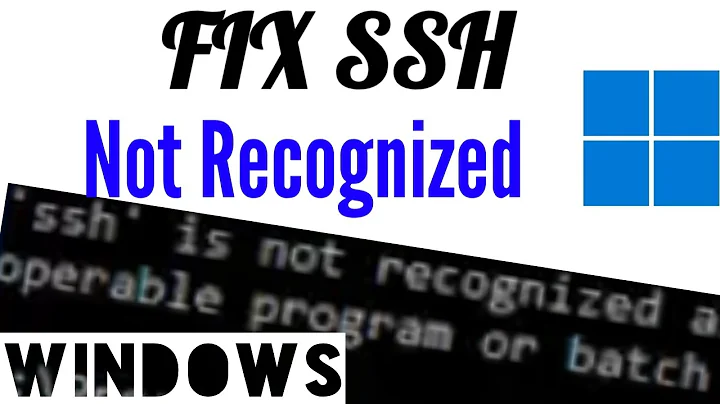Remote SSH Commands - bash bind warning: line editing not enabled
Solution 1
Having an interactive session is not enough for bind to work. For instance emacs shell provides an interactive session which passes the if [ -t 1 ] test but it does not have the line editing so any binds in your ~/.bashrc will generate the warnings. Instead, you can check if the line editing is enabled by doing something like this (is there a simpler/better way?):
if [[ "$(set -o | grep 'emacs\|\bvi\b' | cut -f2 | tr '\n' ':')" != 'off:off:' ]]; then
echo "line editing is on"
fi
Solution 2
ssh host 'ls -als'
When you ask ssh to run a command on the remote system, ssh doesn't normally allocate a PTY (pseudo-TTY) for the remote session. You can run ssh with -t to force it to allocate a tty:
ssh -t host 'ls -als'
If you don't want to type that all the time, you could add this line to the ".ssh/config" file on your local host:
RequestTTY yes
Alternately, you could fix the ".bashrc" file on your remote system to avoid running commands that presume the session is interactive when it isn't. One way is to enclose the commands in a test that the session has a TTY:
if [ -t 1 ]
then
# standard output is a tty
# do interactive initialization
fi
Solution 3
If there is no line editing, these bind commands themselves are harmless. Suppress the warnings:
bind '"^[[A":history-search-backward' 2>/dev/null
bind '"^[[B":history-search-forward' 2>/dev/null
This is somewhat inelegant, still it should work. Other answers don't agree about the best/sufficient test. My approach circumvents this. It doesn't scale well though. The two commands alone should not make a big difference; but if you had more, like dozens, then a proper conditional would probably be better.
Solution 4
Put the bind commands into an 'if' statement that checks whether the bash session allows line editing:
if [[ ${SHELLOPTS} =~ (vi|emacs) ]]; then
bind '"^[[A":history-search-backward'
bind '"^[[B":history-search-forward'
fi
Related videos on Youtube
Lin Forrest Yang
Software architect, maker of things. FPV multirotor aerial video enthusiast. All of my code and snippets in questions/answers are WTFPL unless otherwise noted. "No plan survives first contact with implementation."
Updated on September 18, 2022Comments
-
Lin Forrest Yang almost 2 years
I am using bash 4.3.11(1) and have the following history plugin installed (via .bash_it):
# enter a few characters and press UpArrow/DownArrow # to search backwards/forwards through the history bind '"^[[A":history-search-backward' bind '"^[[B":history-search-forward'When I log in to an interactive session all is well but when I run remote commands via
ssh host 'ls -als'for example, I see the following output:: ssh host 'ls -als' /home/ubuntu/.bash_it/plugins/enabled/history.plugin.bash: line 3: bind: warning: line editing not enabled /home/ubuntu/.bash_it/plugins/enabled/history.plugin.bash: line 4: bind: warning: line editing not enabledWhen I modify the history plugin with
echo -e '\0033\0143'after each bind call I no longer get the warnings but my console is cleared. Not a huge drawback but it would be nice to know a cleaner way to suppress this for remote commands.# Works, but annoyingly clears console # enter a few characters and press UpArrow/DownArrow # to search backwards/forwards through the history bind '"^[[A":history-search-backward' echo -e '\0033\0143' bind '"^[[B":history-search-forward' echo -e '\0033\0143' -
Ahmed Masud almost 5 yearsActually this answer is incorrect, see @alexander-vorobiev's answer below.
-
Ahmed Masud almost 5 yearsThis should be the correct answer
-
Ahmed Masud almost 5 yearsThe easier way would be to use
[[ ${SHELLOPTS} =~ (vi|emacs) ]] && echo 'line-editing on' || echo 'line-editing off' -
 Jonathan Hartley over 4 yearsGood point. Have an upvote. :-)
Jonathan Hartley over 4 yearsGood point. Have an upvote. :-) -
hraban over 4 yearsless faff regex and more robust:
if set -o | grep 'on$' | grep -q '^\(vi\|emacs\)\b'; then .... -
Yongwei Wu about 4 yearsWhether it is strictly correct or not,
-t 1does solve the problem for me. It does not affect the vim terminal session or external command, either. -
Yongwei Wu about 4 yearsFYI: Vim's terminal session works with
bind, and itsSHELLOPTScontains the string "emacs" (though I am not sure of the reason). -
IpsRich about 3 yearsLooks like this is the "proper" way of detecting whether a shell is interactive.





![How to Install SSH Server on Windows 10 - Remote into your computer using a Command Line [OpenSSH]](https://i.ytimg.com/vi/HCmEB5qtkSY/hq720.jpg?sqp=-oaymwEcCNAFEJQDSFXyq4qpAw4IARUAAIhCGAFwAcABBg==&rs=AOn4CLACcxgYtJCsYA_Vo0Xw9Tu5DaIIrw)


